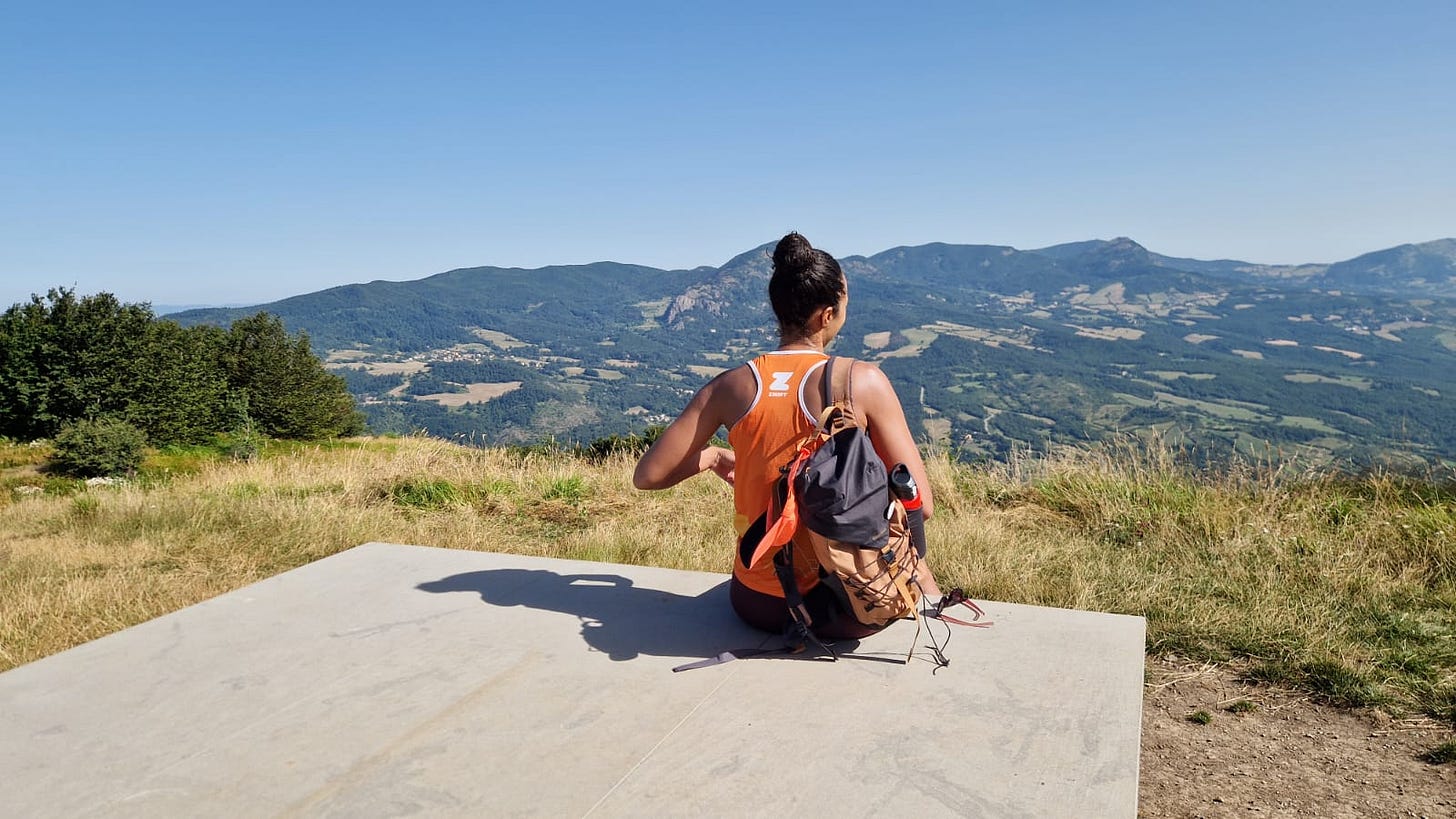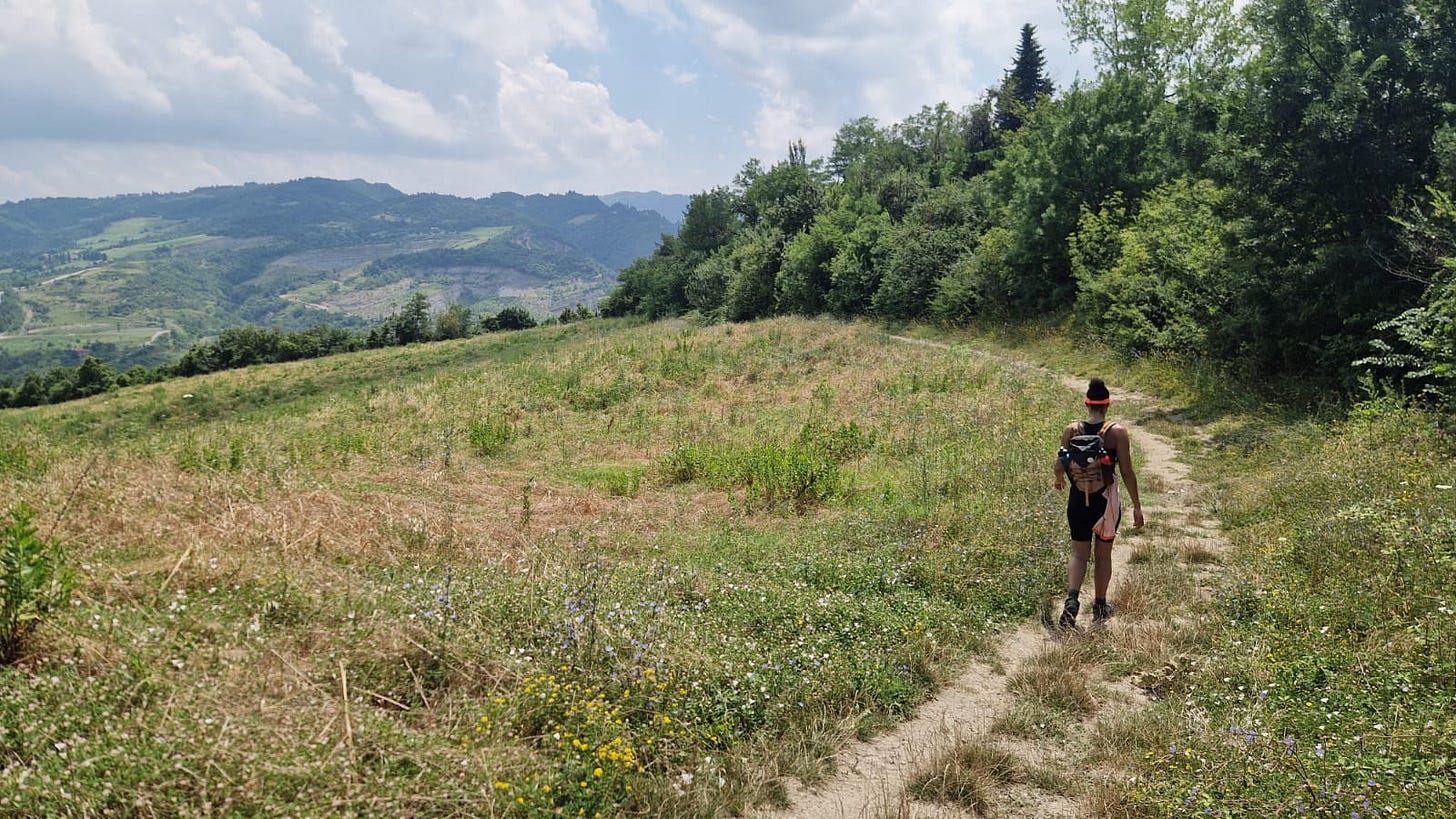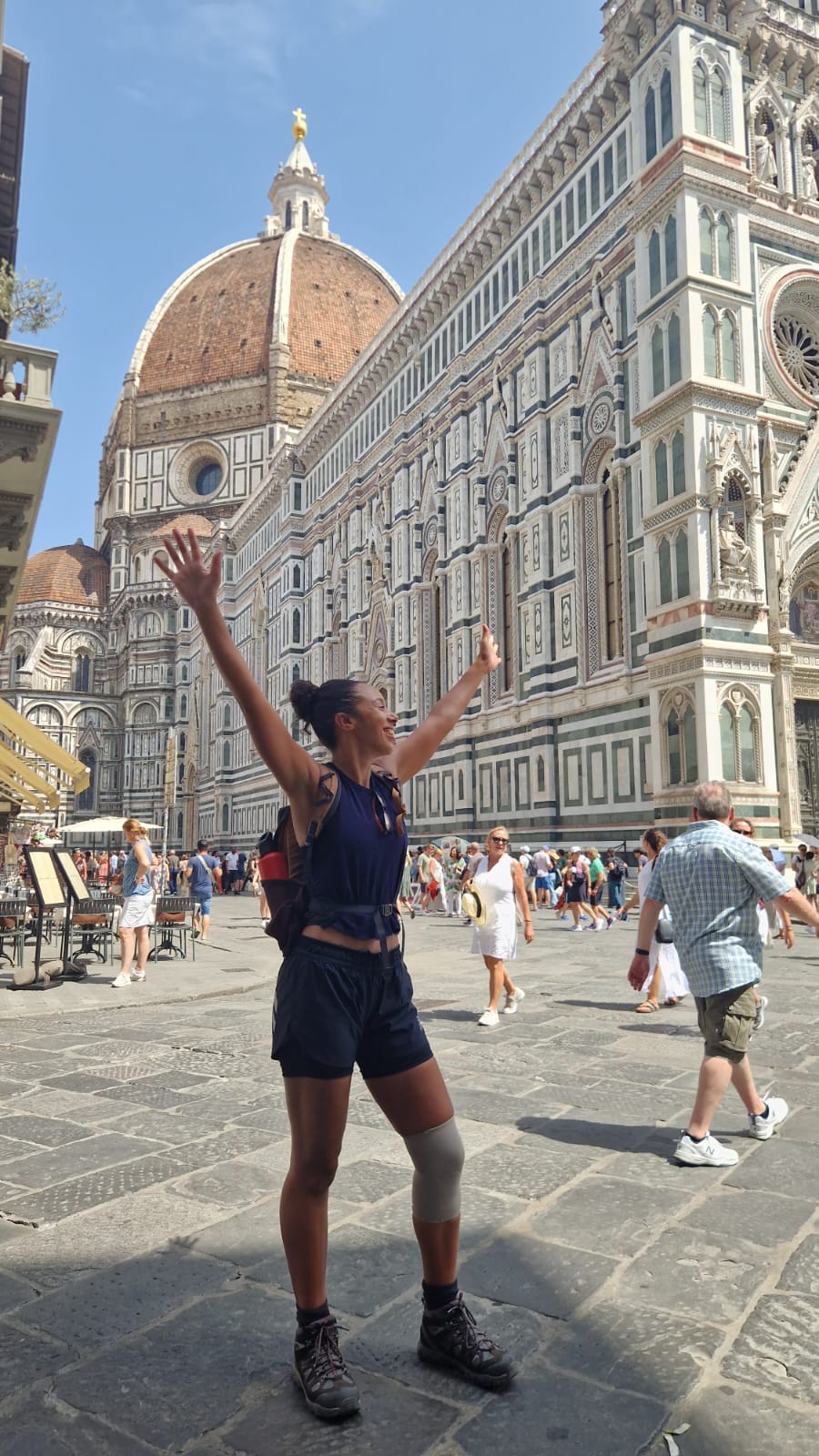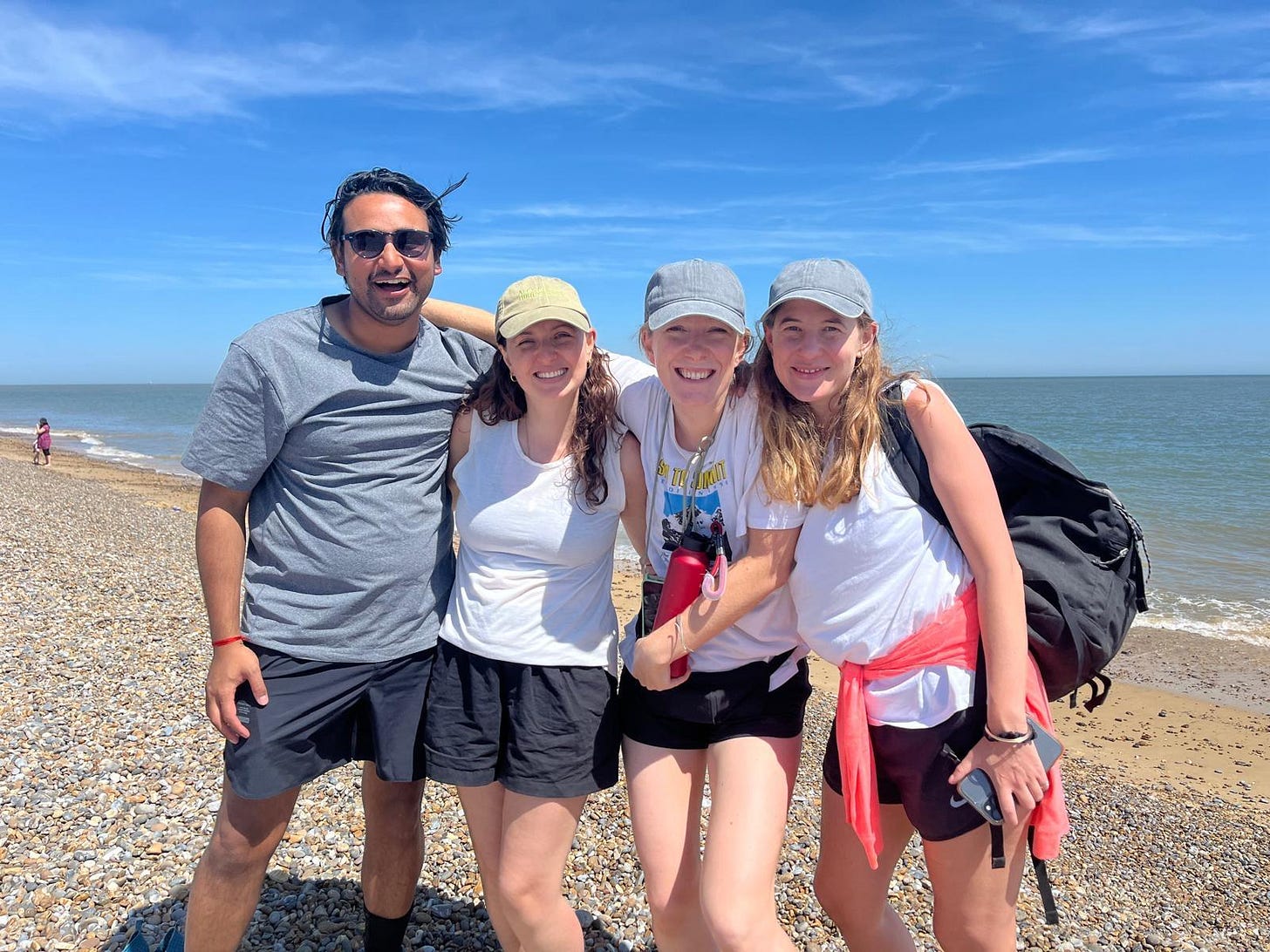Walk it off
If you have to experience anticipatory grief, the place to do it is in the Italian wilderness beneath a blazing blue sky.
While we waited for the doctors to tell us how long my mother would live, I went hiking in the Italian countryside.
The plan was to walk from Bologna to Florence. My boyfriend and I booked the trip before Mum became unwell, before the diagnosis, when the world still felt light and beautiful and hikable. But now, trapped in a limbo of not-quite-arrived horror, the idea of leaving was impossible.
I didn't want to go. I didn't want to be out of the country. The whole trip was only a week long, but time had melted in the face of disaster and every second felt terrifyingly weighted. I had learnt that life could collapse in on itself in a second – so anything could happen in a week.
Mum insisted. She wouldn't hear of us cancelling the trip. She even drove me to Decathlon to help me pick out hiking gear; cushioned socks, a luminous pink visor, walking boots with flecks of pink and purple between the laces ('those are the least ugly' she said).
'I can't,' I said to her. 'I can't go right now.'
'I need you to,' she replied.
A few days later I found myself in the blistering heat of Bologna, wearing the least ugly walking boots and weighed down with giant water bottles, blister plasters, protein bars, and the heaviest item of all – a sense of impending doom.
We had the trail mostly to ourselves. We walked for hours each day without encountering another person, or a car, or a building. Every day brought with it a new landscape. Flat meadows patchworked with lilac wildflowers, shadowy forests with dappled light and twisted roots underfoot, steep, rocky hills that took us up and up to slightly cooler air and postcard-perfect views. The hills rolled on, as far as we could see. I felt wonderfully insignificant. My problems, my fears, my life, were smaller, shrunk by the force of a beauty that existed before we arrived, and will continue long after us.
As we passed through tiny villages the locals watched us from shaded benches, sometimes shouting things at us with an incredulous smile. We didn't have to speak the language to know they were calling us crazy. It was too hot. Europe was baking in 40 degree heat. We had started the hike at the wrong time, the height of summer. But we didn't care. We hiked topless, sweat dripping down our backs, finding relief in stretches of shaded woodland, hyping each other up to make it along the punishing exposed roads. It all added to the challenge.
Every evening we arrived at a B&B, ate our weight in pasta and collapsed into bed, our legs humming. I had underestimated how physically challenging the hike would be, and neither of us had really trained. I naively believed gym fitness would translate to mountain trails, but this was a different kind of endurance. On the longest days, there were moments it felt impossible. My legs were numb, my feet torn up and in agony. I would ask my boyfriend and keeper of the map how much further, trying to keep my voice light, and would almost collapse on the ground when he told me there were still hours to go.
But we kept walking. Every time I wanted to give up, I mustered the necessary energy from somewhere to keep going. Not because of any great moral character or inner strength, but simply because there was no other choice. The only thing to do was to feel the pain, acknowledge it, and continue to put one foot in front of the other. It was an excruciatingly on-the-nose metaphor, and it helped.
I liked the idea that I could endure anything. No matter how painful it was. Because there was no choice, no option of turning back. The inevitability of this was comforting. I was practicing for what was to come.
My mother's appointment with the oncology team was to happen on the final day of our hike. I had no roaming data, so I would have to wait until we reached Florence to hear the news, find out the plan, if there were to be a plan. My biggest fear was that we were too far along, that there was no plan. Nothing more we can do.
Throughout the day, images of my mother in sterile waiting rooms, stern doctors, wringing hands, and tear-smeared cheeks, flashed across my consciousness. I tried to remain in my body, focusing on the slight burn in my lungs, the heartbeat in the balls of my feet, the spires of Santa Maria del Fiore that bobbed closer with every step.
Somewhere on the final stretch, my knee gave out. A twinge became a limp that became an inability to put any weight through my right leg. We were a couple of hours out of the city.
My boyfriend suggested a bus. We had practically done the whole route. No one would know. But I would know. The universe would know. I had to complete every step. It felt bigger than me.
We passed a pharmacy and strapped my knee up as best we could. Then I hopped, hobbled and limped the final two hours of our hike. When it got too hard, my boyfriend half carried me through the throngs of Florence tourists. It was a Herculein effort. The heat had intensified as we dropped down into the city and we were drenched in sweat, stopping frequently to sip water and catch our breath. The pain in my knee was making me nauseous. But we were almost there.
Without warning, the winding, crowded side-streets opened up to reveal the cathedral in the centre of a giant plaza, sunlight bouncing blindingly off marble. It was bigger and more ornate than any I had ever seen. It was our finish line. I lifted my arms and burst into tears. We made it.
Then I remembered mum. I connected to the wifi and called her. Her voice soared to me across the ocean. I was holding her hand. She was next to me as I perched on the edge of some ancient fountain, waiting for her to tell me what happens now. She sounded bright and clear.
There was a plan. There were things the doctors could try. There was time. Not a lot of time. But there was some. I undid the laces of my walking boots and released my throbbing feet, resting them against the sun-warmed stone of the fountain. I tried to hold on to the feeling from the mountains, the safety of feeling small. But mum always had a way of making me feel significant. She asked me about the walk, she asked about the food and the weather and the views, she wanted all the details of my joy. She wasn’t going to let me disappear.
Sponsor us
This weekend we are walking again. My beautiful friends Ryan and Scarlett are walking the Suffolk Coastal Path across five days to raise money for Pancreatic Cancer UK, and in memory of Scarlett's wonderful mum Bee.
My boyfriend and I (and our thrill-seeking one-year-old) are joining for the final day of the walk – and we would be so grateful if you could spare a small donation to help them reach their target of £10k (they're SO close).
Please follow this link to donate:
Around 10,500 people a year are diagnosed with pancreatic cancer in the UK, but it has the lowest cancer survival rate with 9,000 dying every year. As well as unimaginable odds, patients also face limited treatment options and are often not diagnosed until the cancer is at a late stage. Sadly 7 in 10 people are diagnosed too late to receive any treatment at all.
With your support, Pancreatic Cancer UK is aiming to double survival rates, so that many more people survive to live long and well. Research is the answer, and progress is coming, but more investment is needed to accelerate the breakthroughs so badly needed for people facing this awful disease and save lives.





